At 20 years old, Caitlyn Schrepfer is currently one of a handful of professional female freestylers on the planet. Altho she’ll be the first to tell you the ranking of freestylers is still a murky and imprecise business, a general consensus puts Schrepfer among the best, and she’s become well-known on the global circuit regularly competing against both men and women. Recently, Schrepfer placed at third female in the world at Super Ball 2016 (regarded as the freestyle world championships), and made it to the quarterfinals in the predominantly male USA championships. She’s travelled the planet over, and when not repping endorsements or maintaining her extremely popular social media accounts, she is laser-focused on how to become the best in the game.
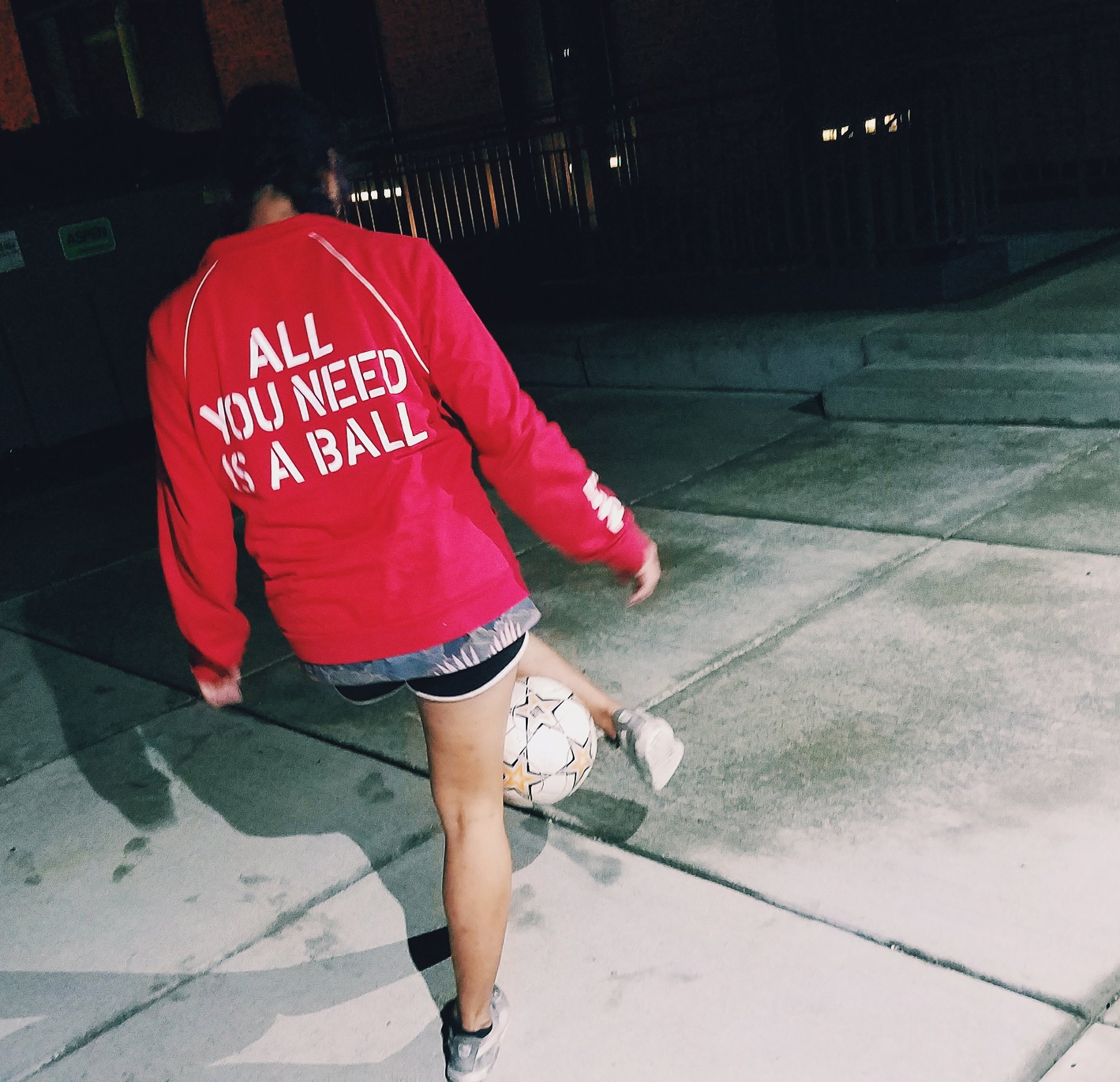
With dyed purple hair, and her signature glowing smile, Schrepfer sometimes feels like a magical unicorn. The Korean-Nepalese adoptee with parents who are parts Japanese, German, Polish, and Swiss, started off as a goalkeeper, and when an injury sidelined her, she happened to find her way into freestyle. Since then, the unassuming student has made a career out of an accidental hobby, gaining sponsorships, fans, and performances all over the world. While most her age can’t articulate what they’re doing with their lives, no less why, Schrepfer possesses a strong vision for her future and puts in the laborious work to get there. The more you get to know her, the more you forget this young pro isn’t old enough to order a beer.
But what’s most remarkable about Schrepfer is that she notably lacks any trace of hardened cynicism. Missing from her visage is the hint of dark rage or gnawing fear which so often motivates the hardcore athlete. Not here. No chip on this gal’s shoulder. What you do see on Caitlyn’s face? An abundance of curiosity. A drive for creation. And an optimism that what you see today can be improved and made better for tomorrow. She represents what makes freestylers so special—both highly competitive and brimming with love for her community. The kind of athlete we can be down with.
That’s why we were thrilled when Schrepfer agreed to be part of Urban Pitch as our first Resident Pro. Schrepfer now joins the UP team as an in-house authority and ambassador on all things freestyle.
We’re happy to welcome Caitlyn to our family and introduce you to perhaps the next world freestyle champ!
Caitlyn Schrepfer + Urban Pitch
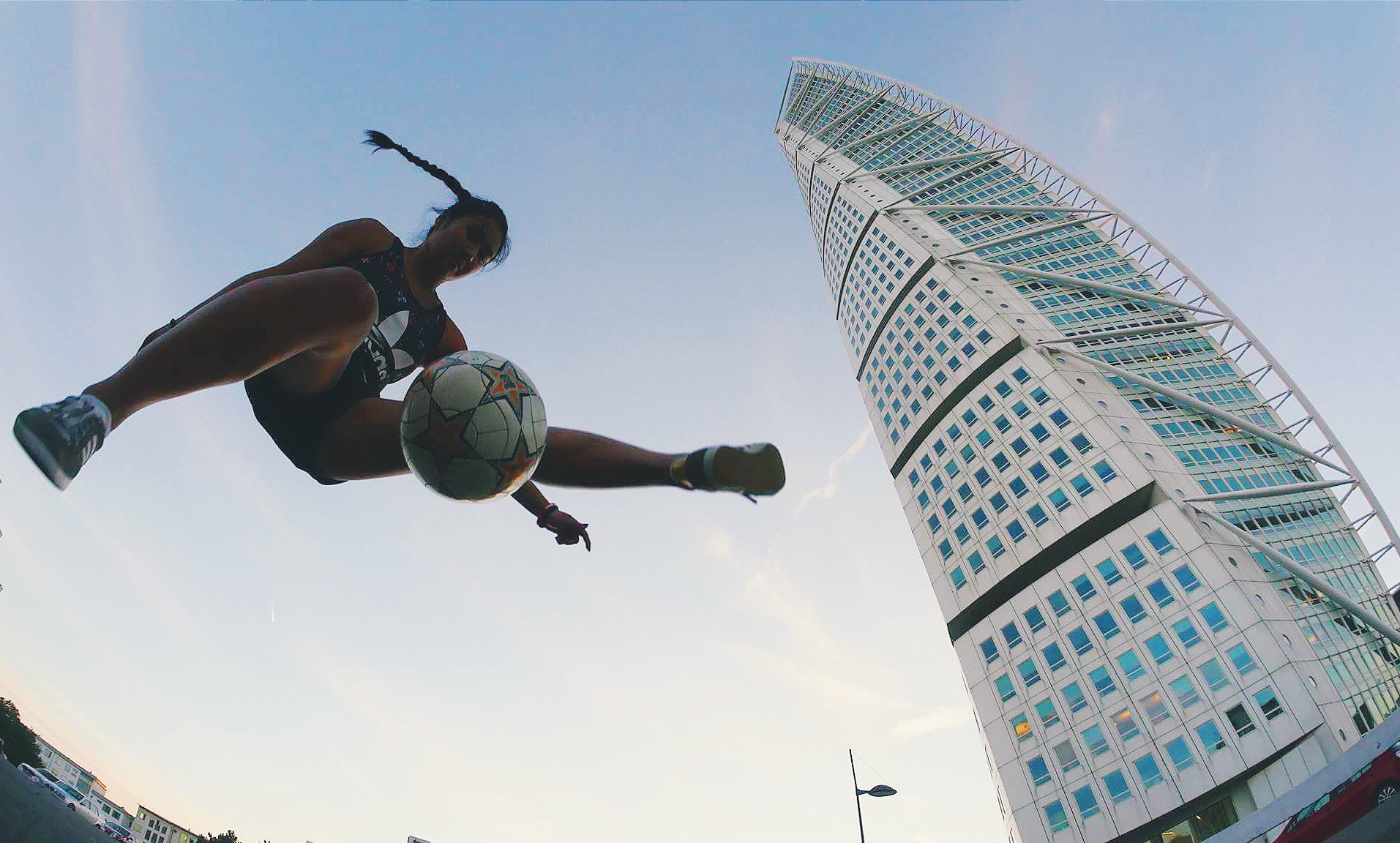
For me, freestyle is freedom …
Urban Pitch: For one of the most ambitious people I know, you’re also super chill. I feel this is a freestyler trait—hardcore at training with a relaxed personality outside, is that an oxymoron?
Caitlyn Schrepfer: I would definitely agree that this is a freestyle trait, though it does manifest differently from freestyler to freestyler. It seems like an oxymoron initially, since I personally tend to be very intense and focused during my training, however the “freestyle life” often involves last minute changes in plans, unexpected complications (especially when it comes to traveling) and pretty flexible schedules, so we learn to go with the flow and not stress as much as many people would in our situations.

Tell me how you came up with your original, signature move, “the catwalk.”
This was actually a pretty random discovery! A fellow freestyler, Borgetti, was watching some rhythmic gymnastics and knew of my gymnast background, so when he saw a particular move during a rhythmic gymnastics set he suggested that I give that trick a go. The catwalk actually went through quite a few variations before I found one that I was happy with, but even now I’m still experimenting with it a bit.
Have you tried teaching it to others? What was the outcome?
There were a few people whom I’ve tried to teach it to, all of which were actually little girls funnily enough. I suppose most other people just think it’s too intimidating to attempt themselves. But it was difficult to teach to the girls because it requires the ability to bend your back far enough that you’re able to hold the ball between your head and back as you flip over, which I think is something that just takes time to develop.
Let’s say I’m a complete newbie, and I’ve just given up my soccer career for whatever reason, but I want to get into freestyle. How long do you think it’ll take to get to a pro level?
That’s difficult to say, as there’s no real consensus for what it means to be a “pro” freestyler. It could take anywhere from 2 years to 4 or more due to all the variables that one needs to take into account, such as skill set, location, demand, etc.
L.A. and the U.S. in general don’t have a very large freestyle scene compared to other countries like Poland, the UK, Russia, and Japan—how do you hope freestyle will develop here in the States?
I have to agree with you, but even just looking at the growth of the L.A. scene in general from the past few years I think that the U.S. freestyle scene will continue to develop pretty rapidly. It’s a bit more difficult for our scene to grow as opposed to the ones in Europe and Asia, due to the lesser interest in soccer which is one of the main ways that people tend to find freestyle, but I believe that freestyle is enjoying more and more exposure here in the States as time progresses.
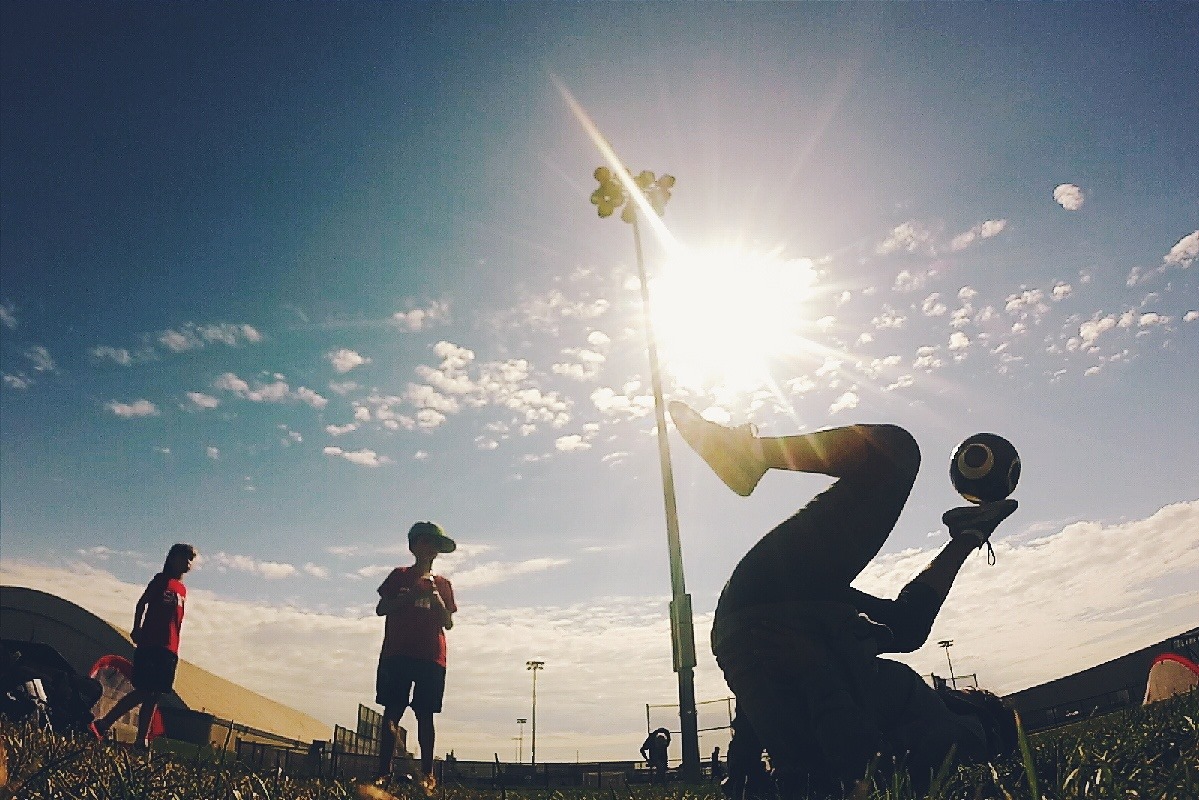
I want to take it as far as I can go … win the World Championships, and be the best …
Super Ball 2016, you finished third place in the world in the female competition. What is it like to be on stage like that performing in front of the world’s best freestylers?
It was an absolutely incredible experience. There were equal parts nerves and excitement, but there was an almost tangible anticipation in the air just before each battle and it really pushed me to try to up my game and live up to the expectations. Without a doubt that experience motivated me to step up my training and work to make it onto that stage again next year, and every year after that.

You are usually one of the rare female pros on the scene in a sea of male freestylers. I don’t want to harp on it, but that kind of makes you a pioneer. Do you see yourself as a role model, particularly for young girls?
I like to consider myself as a role model for every newcomer, but yes especially young girls as well. I know that what I do as a freestyler is far from easy— mentally, physically, and emotionally—and I believe it builds character in a way that not many things can due to its way of pushing your limits, so I try to encourage people to challenge themselves and not fear failure because I’ve experienced firsthand how much that can help you grow.
I have also had the pleasure recently of coaching at a freestyle camp with SWRL and mentoring a number of young girls there. It was incredible for me to see the way they blossomed from a shy and quiet minority in a camp with a number of older children, many of which were boys, into an outgoing and high-achieving group of girls who weren’t afraid to show their skills.
You competed against elite U.S. freestylers at the Chicago competition where you made it to the quarterfinals, and this is not the female division it was the best in the U.S., male and female. Do you think freestyle can be one of the rare sports where women compete against men and do you have aspirations to be the best overall freestyler regardless of gender?
I definitely see freestyle as one of those sports that lack that male/female boundary compared to other mainstream sports. Although it may be unusual on a larger scale, I don’t feel like an outsider at all when competing amongst the males at the USA and North American competitions, and I feel like an equal amongst the male competitors. I would definitely love to become one of the best freestylers regardless of gender, but I also know that will take an extremely large amount of work at the same time! However, it is certainly an aspiration that keeps pushing me to improve my level, and I look forward to the day when I am able to compete with the best of the best!
Freestylers seem very supportive, but there are some disagreements, in particular the way competitions are judged, and the philosophy of freestyling—what constitutes “real” freestyle and whatnot. What’s your take on that?
I believe that these kinds of disagreements are bound to happen, and in many ways beneficial for the sport, as it keeps evolving and changing it rather than accepting these things without question. Freestyle is a very subjective sport, a personal way of expressing one’s self, and as such it will be hard to judge in competitions. As for what constitutes “real” freestyle, I don’t particularly favor one side of the debate over another—I personally enjoy lowers, which is one of the most common styles, but at the same time I think it’s great to develop your own brand of freestyle as well.
I try to encourage people to challenge themselves and not fear failure because I’ve experienced firsthand how much that can help you grow.
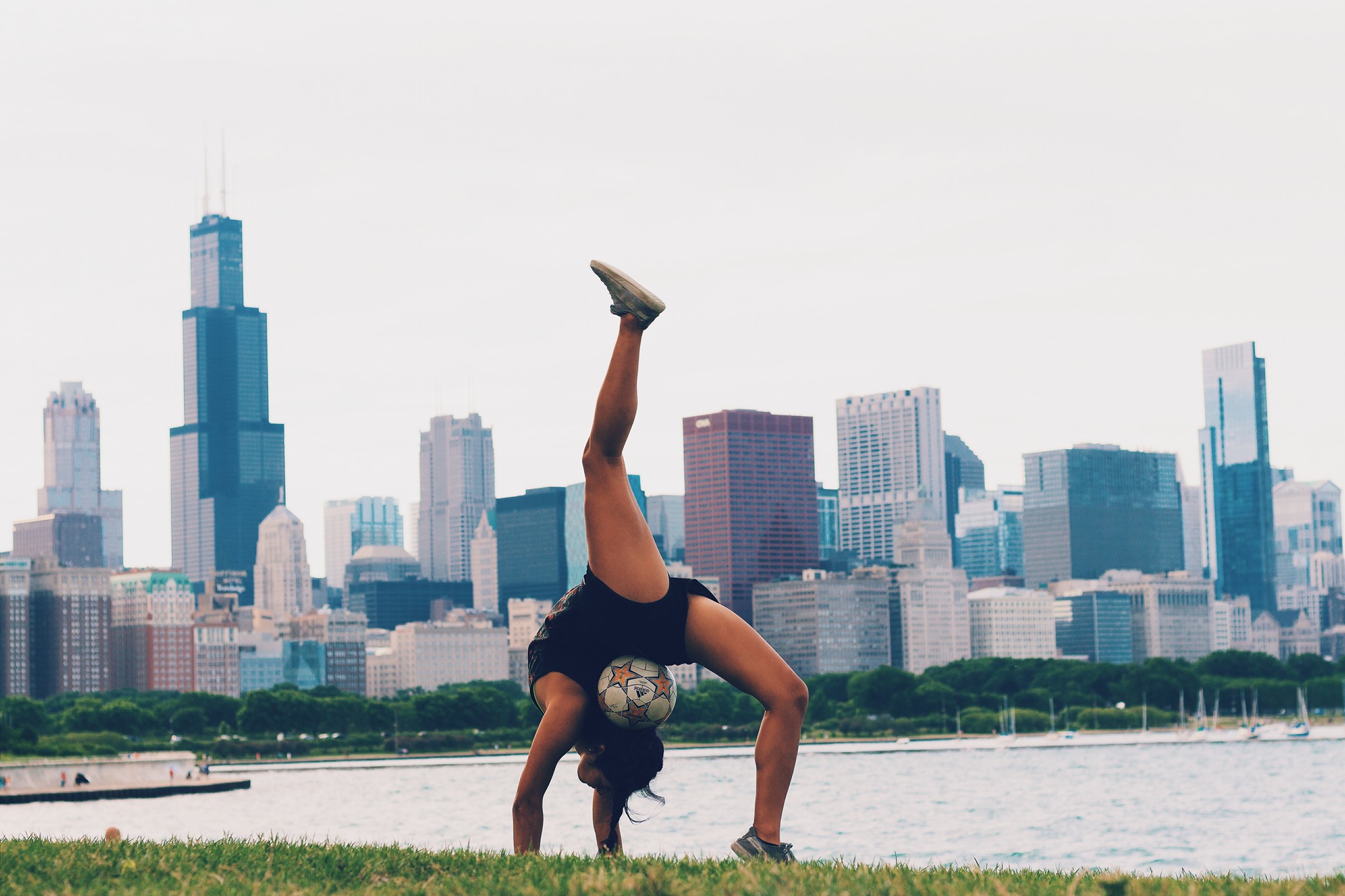
Favorite freestyler?
Tom Folan, Tobias Becs, and Pavlinoff.
Walk us through a typical day in the life of Caitlyn.
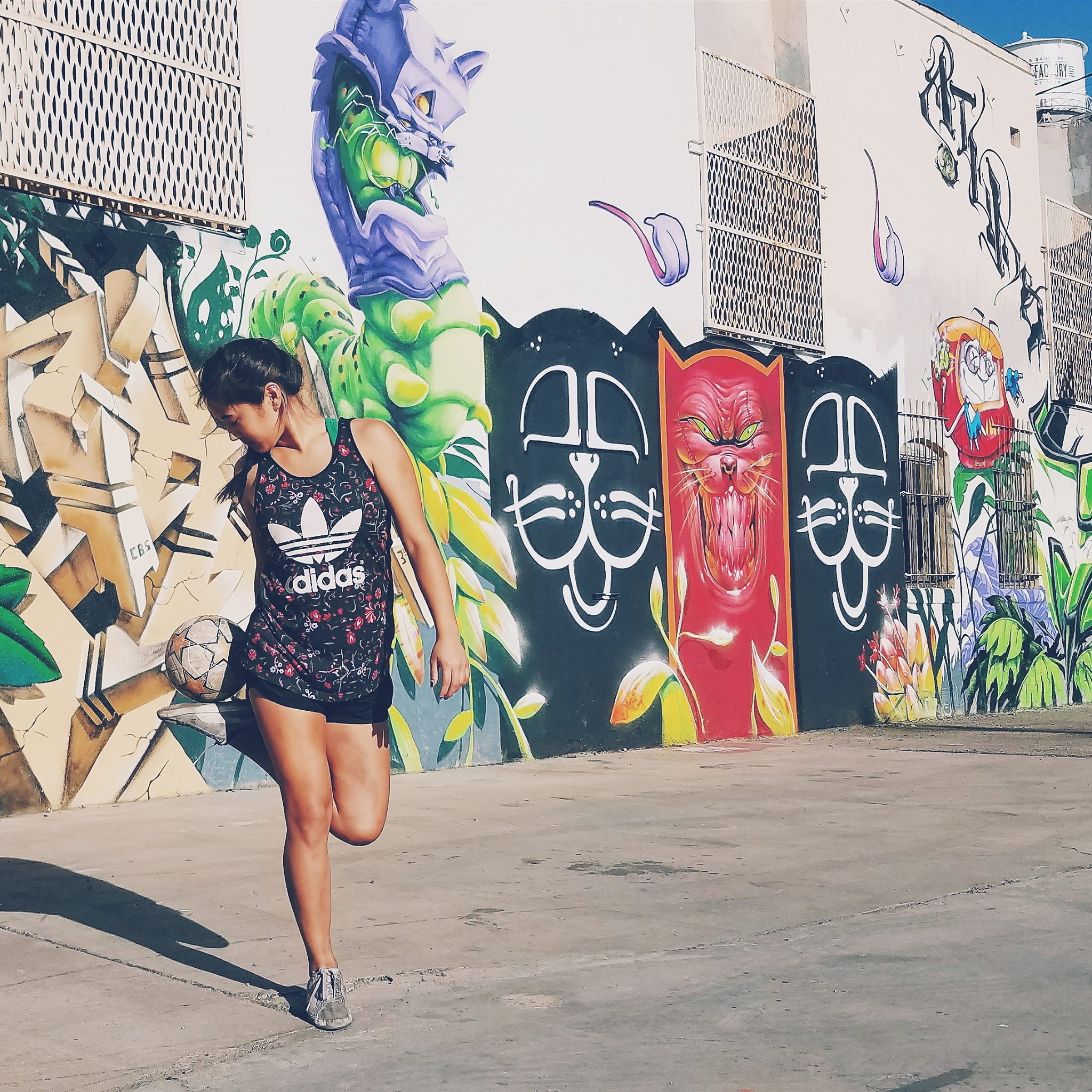 Oh man, I don’t know that any day in my life can be considered typical. Most days I’ll wake up around 8:30 and jump on my laptop and answer some emails, do some editing, or watch some freestyle videos. I’ll go make breakfast after that, then head to the gym for my first training session which will usually last between 2 to 3 hours, before heading home to make lunch. What I make for lunch tends to vary since I’ve been enjoying cooking and been messing around with a bunch of new recipes. After that I will usually try to work in some more video editing before I go for a walk with my mom—usually for about an hour and a half or so. Then I’ll head back to the gym or to my night training spot for a more relaxed training session to finish off the day.
Oh man, I don’t know that any day in my life can be considered typical. Most days I’ll wake up around 8:30 and jump on my laptop and answer some emails, do some editing, or watch some freestyle videos. I’ll go make breakfast after that, then head to the gym for my first training session which will usually last between 2 to 3 hours, before heading home to make lunch. What I make for lunch tends to vary since I’ve been enjoying cooking and been messing around with a bunch of new recipes. After that I will usually try to work in some more video editing before I go for a walk with my mom—usually for about an hour and a half or so. Then I’ll head back to the gym or to my night training spot for a more relaxed training session to finish off the day.
What’s the end game for you in freestyle?
I want to take it as far as I can go. I want to do what Andrew Henderson did—win the World Championships, and be the best, but also to grow the sport and really encourage more people, especially more girls, to get into freestyle and keep pushing the level.
If you had to give brutally honest advice to anyone looking to be a full-time professional athlete, what would you say?
You will have to make sacrifices. Being a professional freestyler, as much as I enjoy it, is not all fun and games. There are days when I would love nothing more than to lay in bed, not train, not edit, and just go spend the day with my friends, but if I want to keep improving and stay on top of my game then I have to dig deep and find the motivation to get up and not waste that time.
In a few words, tell me why you love freestyle.
For me, freestyle is freedom. It’s my sanctuary from all the stressors in life and a way for me to really stretch myself and discover what I’m capable of.
Hear more from Caitlyn on our exclusive Urban Pitch podcast as she dishes with fellow freestylers Umar Dalati and Tom Folan.
Photos and video by Sotero Delgado. Additional photography courtesy of Caitlyn Schrepfer. Music by Scott “Chops” Jung.
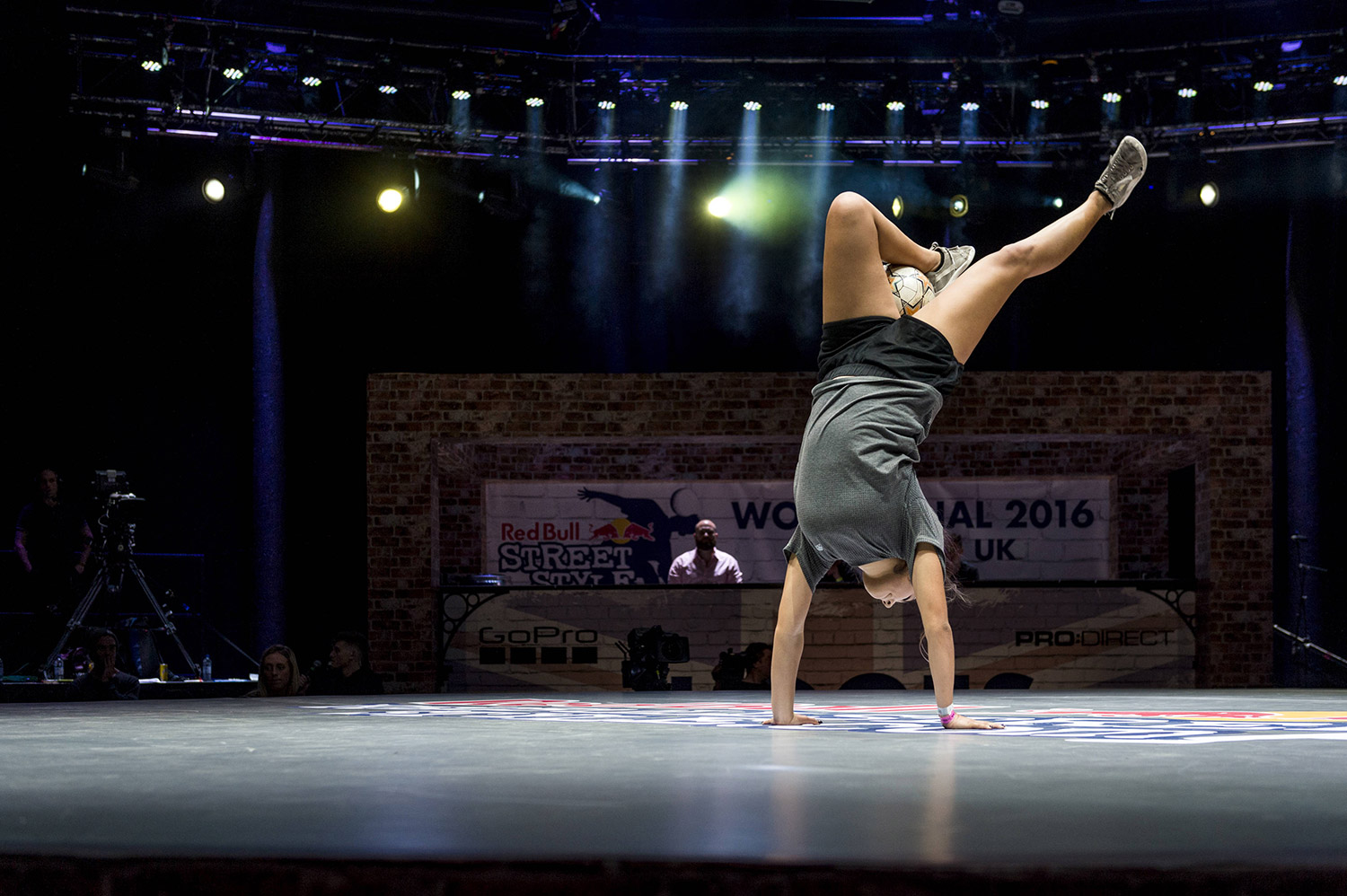








[…] “I have also had the pleasure recently of coaching at a freestyle camp with SWRL and mentoring a number of young girls there. It was incredible for me to see the way they blossomed from a shy and quiet minority in a camp with a number of older children, many of which were boys, into an outgoing and high-achieving group of girls who weren’t afraid to show their skills,” Schrepfer told Urban Pitch. […]